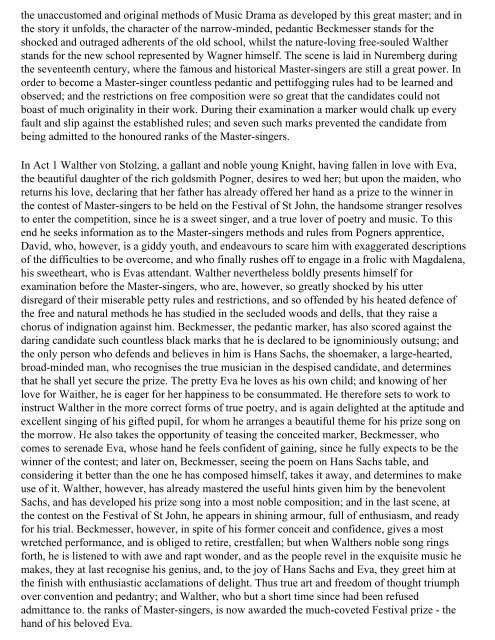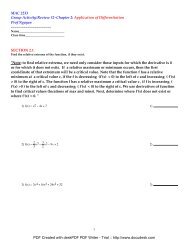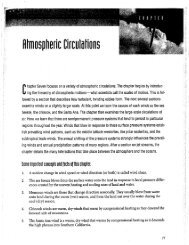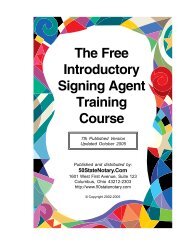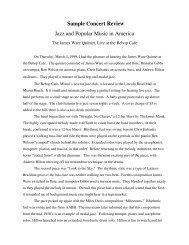Opera Plots I - MDC Faculty Home Pages
Opera Plots I - MDC Faculty Home Pages
Opera Plots I - MDC Faculty Home Pages
You also want an ePaper? Increase the reach of your titles
YUMPU automatically turns print PDFs into web optimized ePapers that Google loves.
the unaccustomed and original methods of Music Drama as developed by this great master; and in<br />
the story it unfolds, the character of the narrow-minded, pedantic Beckmesser stands for the<br />
shocked and outraged adherents of the old school, whilst the nature-loving free-souled Walther<br />
stands for the new school represented by Wagner himself. The scene is laid in Nuremberg during<br />
the seventeenth century, where the famous and historical Master-singers are still a great power. In<br />
order to become a Master-singer countless pedantic and pettifogging rules had to be learned and<br />
observed; and the restrictions on free composition were so great that the candidates could not<br />
boast of much originality in their work. During their examination a marker would chalk up every<br />
fault and slip against the established rules; and seven such marks prevented the candidate from<br />
being admitted to the honoured ranks of the Master-singers.<br />
In Act 1 Walther von Stolzing, a gallant and noble young Knight, having fallen in love with Eva,<br />
the beautiful daughter of the rich goldsmith Pogner, desires to wed her; but upon the maiden, who<br />
returns his love, declaring that her father has already offered her hand as a prize to the winner in<br />
the contest of Master-singers to be held on the Festival of St John, the handsome stranger resolves<br />
to enter the competition, since he is a sweet singer, and a true lover of poetry and music. To this<br />
end he seeks information as to the Master-singers methods and rules from Pogners apprentice,<br />
David, who, however, is a giddy youth, and endeavours to scare him with exaggerated descriptions<br />
of the difficulties to be overcome, and who finally rushes off to engage in a frolic with Magdalena,<br />
his sweetheart, who is Evas attendant. Walther nevertheless boldly presents himself for<br />
examination before the Master-singers, who are, however, so greatly shocked by his utter<br />
disregard of their miserable petty rules and restrictions, and so offended by his heated defence of<br />
the free and natural methods he has studied in the secluded woods and dells, that they raise a<br />
chorus of indignation against him. Beckmesser, the pedantic marker, has also scored against the<br />
daring candidate such countless black marks that he is declared to be ignominiously outsung; and<br />
the only person who defends and believes in him is Hans Sachs, the shoemaker, a large-hearted,<br />
broad-minded man, who recognises the true musician in the despised candidate, and determines<br />
that he shall yet secure the prize. The pretty Eva he loves as his own child; and knowing of her<br />
love for Waither, he is eager for her happiness to be consummated. He therefore sets to work to<br />
instruct Walther in the more correct forms of true poetry, and is again delighted at the aptitude and<br />
excellent singing of his gifted pupil, for whom he arranges a beautiful theme for his prize song on<br />
the morrow. He also takes the opportunity of teasing the conceited marker, Beckmesser, who<br />
comes to serenade Eva, whose hand he feels confident of gaining, since he fully expects to be the<br />
winner of the contest; and later on, Beckmesser, seeing the poem on Hans Sachs table, and<br />
considering it better than the one he has composed himself, takes it away, and determines to make<br />
use of it. Walther, however, has already mastered the useful hints given him by the benevolent<br />
Sachs, and has developed his prize song into a most noble composition; and in the last scene, at<br />
the contest on the Festival of St John, he appears in shining armour, full of enthusiasm, and ready<br />
for his trial. Beckmesser, however, in spite of his former conceit and confidence, gives a most<br />
wretched performance, and is obliged to retire, crestfallen; but when Walthers noble song rings<br />
forth, he is listened to with awe and rapt wonder, and as the people revel in the exquisite music he<br />
makes, they at last recognise his genius, and, to the joy of Hans Sachs and Eva, they greet him at<br />
the finish with enthusiastic acclamations of delight. Thus true art and freedom of thought triumph<br />
over convention and pedantry; and Walther, who but a short time since had been refused<br />
admittance to. the ranks of Master-singers, is now awarded the much-coveted Festival prize - the<br />
hand of his beloved Eva.


